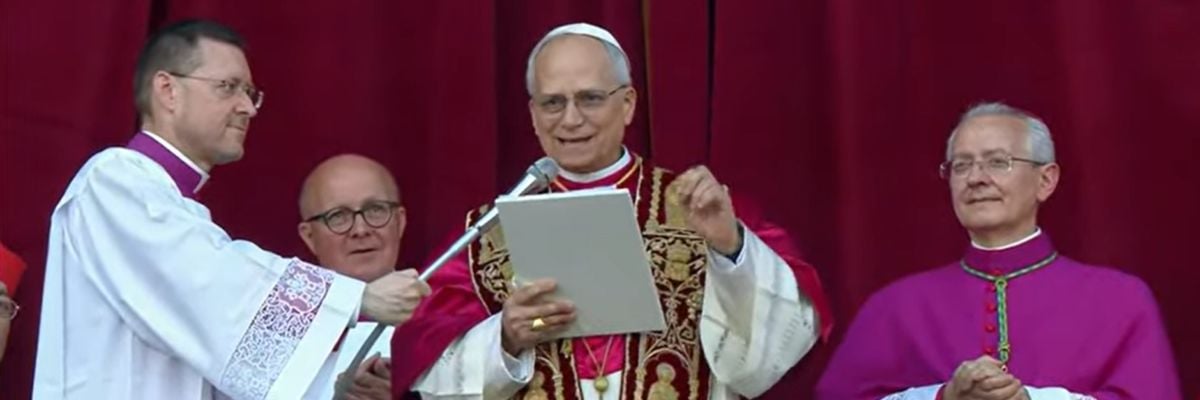
In this video, apologist Karlo Broussard and host Cy Kellett respond to the claim that the Pope’s word is equivalent to God’s Word.
Transcript:
Cy: The Catholic Church and the Pope claim to be infallible interpreters of the Bible. But if that’s the case, then statements by the Church and statements by the Pope would be on the same level of authority as the written word of God. They would be on a par with the speech of God. And I guess the corollary to that is that’s not acceptable; therefore, it can’t be true.
Karlo: Yes, this is an argument that’s made by several Protestant scholars and apologists. Protestant author Matthew Barrett makes it in his book *God’s Word Alone*. Protestant apologist and historian Gavin Ortland makes it as well in his book *What It Means to Be Protestant*.
Cy, the problem with this sort of objection is that it assumes infallibility is logically identical to inspiration. It assumes they’re the same thing, or to state it differently, it assumes that inspiration is the only way to guarantee something to be infallible, guaranteed to be without error.
Now, it’s true that whatever is inspired, that’s to say God-breathed, is infallible. And the prime example of that would be Scripture. Scripture is an infallible testimony insofar as its words are inspired by God. It’s infallible of itself because God is the primary author who is infallible of himself, and he cannot possibly err.
However, we can conceive of the concept of infallibility without inspiration. And here’s the way we can do that.
Cy, would you agree with me that infallibility, a good working definition of infallibility, would be guaranteed to be free from error? Does that map on with how you understand perfect mapping?
Okay, now compare that to the concept of inspiration. Inspiration specifies a way in which something can be guaranteed to be free from error, that is, guaranteed to be infallible. So notice there.
We can see that these are two logically distinct concepts. Infallibility is guaranteed to be free from error, inspiration being a specific way in which something is guaranteed to be free from error. So they’re not logically identical.
And given this distinction, we can see that there is a possibility, at least, of there being another way in which something can be guaranteed to be free from error that is infallible. That other way would be what we claim as Catholics to be the doctrine of infallibility, a protection from error such that God ensures that whatever is taught by the magisterium of the Church or the Pope by himself, binding on Christians, on the consciences of Christians in matters of faith and morals, to be free from error.
God ensures that it will be free from error without inspiring the very words used, or even without inspiring the very concepts themselves. So the Church’s teaching simply is free from error by divine protection, without the words themselves being the very speech of God or being God-breathed.
Now, with this understanding and the logical distinction between infallibility as we understand it concerning Church magisterial teaching, whether an ecumenical council or the Pope by himself, and inspiration, we can see that the objection loses its force insofar as it claims the infallible interpreter of the Bible, the Pope and magisterium, are on a par with the speech of God.
So I ask you this, Cy. Consider these two concepts. We have something being infallible by way of divine protection, where God ensures to protect a teaching from error, like in the case of the infallible magisterial teaching of the Church and the Popes in the past. Compare that with an infallible testimony that’s infallible of itself, like God’s very own words that he authors.
I ask you, Cy. Are those two things equal and on a par in authority, or is one superior to the other?
Cy: Yeah, clearly the latter is superior. I mean, just to be free from error would allow all kinds of things that would not be possible with Scripture. Like you could… Scripture is beautiful. Well, that doesn’t… But the words of the Pope aren’t necessarily beautiful. They’re just not wrong.
Karlo: Right? That’s right. So you can see how there would be a distinction, a difference, an essential difference in the level of authority between God’s very own speech, which is infallible insofar as it is God’s words, and infallible papal and magisterial teaching, which is infallible by way of God protecting it from error, not because it’s infallible of itself as God’s Word.
So we can still preserve the uniqueness of Sacred Scripture as the inspired, God-breathed Word of God and even its superior authority to the Magisterium itself. And this is why the Second Vatican Council, in its Dogmatic Constitution on the Word of God, *De Verbum*, teaches that the Magisterium is not on a par with God’s Word in Sacred Scripture and as found in Sacred Tradition, but is the servant of the Word of God.
And once we’re able to articulate the distinction between infallibility and inspiration in the way that I’ve just done, then you can see how the claim that the Church, the magisterium, and the Pope is the infallible interpreter of the Bible does not make that authority on a par with and equal to God’s very own words.
And so the objection is working on a flawed assumption. And what’s driving the objection, namely the fear that we’re making this authority equal to God’s own speech, can be quelled once we make the proper distinctions.
Cy: Okay, but there is a follow-on objection, I think, and that is that if the claim to be the faithful interpreter of the Bible, if that’s the claim for the Church and for the Pope, that seems to make man the decisive factor rather than God’s Word being the decisive factor.
Karlo: Yeah, and that’s a good fair counter-argument that we need to consider. Dr. John Armstrong makes this argument in his essay “The Authority of Scripture,” found in the book *Sola Scriptura: The Protestant Position on the Bible*.
I think the first thing we can say, Cy, is to turn the table. Dr. Armstrong actually claims that he knows what the word of God is and the proper meaning of the word of God on account of the inner testimony of the Holy Spirit, the Holy Spirit witnessing to him.
Well, if that’s the case, within the logic of this sort of objection would apply to him as well. Just as he says the Church becomes the decisive factor in insofar as the Church is moved by the Spirit to infallibly interpret the Bible, he too would just simply be putting himself in the Church’s place as being moved by the Spirit to interpret Sacred Scripture.
So the logic would apply to him as well, which would not be good for this sort of counter-argument.
And lastly, I would say this: within the theological framework of Sola Scriptura, which entails that there is no other infallible testimony besides Scripture itself, which leaves us with fallible interpreters alone. Oh yes, in that theological framework, guess where the logic applies? That theological framework, where man would be the decisive factor. Each man, each individual man, as opposed to the Catholic theological framework of infallibility, where it’s not man who is the decisive factor, but it is ultimately God.
Because in the Catholic understanding of infallibility, it is God who divinely protects and ensures that the magisterium and the Pope will not teach error on matters of faith and morals binding on the consciences of God’s people here on earth.
So I would argue that it’s actually the Catholic view of infallibility that excludes this idea of man being the final decisive factor as opposed to God’s Word. So the claim is, and turn the table and say it’s actually within the theological framework of Sola Scriptura where man, fallible man, becomes the decisive factor as opposed to God’s Word.
Cy: There was a little turnabout there at the end. Got turned around on this little jujitsu that you did there.
All right, Dr. Karlo, we started. Thanks. I got to take a break. But we got, as we were talking, full lines, so we got lots of people who have… I don’t know if that’s good or bad. We have lots of people who have a Catholic doctrine that troubles them. We will get to them right after this on *Catholic Answers Live*.



